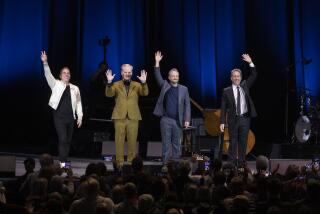Unfunny Chaplin Episode
- Share via
The Tramp himself called it the “cleverest and most brilliant film I have yet made.”
Critics didn’t agree. Moreover, “Monsieur Verdoux”--which screens Saturday at UC Irvine--sparked a vociferous outcry over his politics that eventually led to Charlie Chaplin’s expulsion from the United States.
Even before “Monsieur Verdoux,” Chaplin had abandoned his tragically compassionate Tramp and turned more heavily than ever to things political with “The Great Dictator,” his famous 1940 satire on Adolf Hitler, a.k.a. Adenoid Hynkel.
The even blacker “Verdoux” came seven years later. In it, the comedic genius plays an ex-banker-cum-Bluebeard who systematically marries rich women, then kills them for their fortunes. He uses the money to support his child and disabled wife.
Chaplin based his character on Henri Desire Landru, who was guillotined in public outside Versailles Prison in 1922 for having murdered a dozen women after luring them to his love nest near Paris.
In a fascinating epilogue 46 years later, a Paris newspaper printed Landru’s confession, which he’d scrawled on the back of a framed drawing he gave one of his attorneys before execution: “I did it. I burned their bodies in my kitchen stove.”
Chaplin’s redrafting of the case, though considered by some a satiric gem (with a hilarious Martha Raye as one of Verdoux’s victims), hasn’t drawn unanimous praise. According to Halliwell’s Film Guide, the movie’s “moral is unconvincing,” its “slapstick sequences too often raise yawns,” and Chaplin’s Verdoux “is more dapper than funny.”
Political repercussions upon its release were even harsher. The movie’s pacifist message, delivered two years after the Holocaust had been revealed, was that the ruthlessness of Chaplin’s Bluebeard reflected society’s values: “Wars, conflict, it’s all business. One murder makes a villain; millions a hero. Numbers sanctify.”
Words like those, at the dawn of the McCarthy era, led the House Committee on Un-American Activities to order Chaplin to testify about his alleged communist affiliations.
Refusing to appear, Chaplin sent the message: “I am not a Communist; neither have I ever joined any political party or organization in my life. I am what you call a peace-monger.”
The London-born actor’s protests were futile, however, and demands were made for his deportation. Then, while sailing from the United States to attend the London premiere of his 1952 film “Limelight,” word came that the British citizen would be denied a reentry visa. Infuriated, Chaplin vowed never to return.
Two decades later, he broke that vow and came to accept an honorary Academy Award bestowed “for the incalculable effect he has had on making motion pictures the art form of this century.”
* Saturday at 7 and 9 p.m. at Crystal Cove Auditorium in UC Irvine’s student center, corner of West Peltason and Pereira drives, Irvine. Not rated. Running time: 129 minutes. $2.50-$4.50. (949) 824-5588.
Works by Rouch Open Documentary Series
UC Irvine’s Film and Video Center launches a Thursday-night series of ethnographic and documentary films tonight with two works by French filmmaker Jean Rouch.
Rouch, who first used a camera as a scholarly tool to record his ethnographic research in Africa, later made short and full-length documentaries and more interpretive, quasi-documentaries in the cinema verite style.
“Les Maitres Fous” (1953-54), a traditional documentary, records a voodoo ritual in present-day Ghana in which a group of Africans throw themselves into a trance, taking on the roles of their white colonial administrators.
Wrote The Times’ Kevin Thomas in 1991: “The full meaning of this ceremony--which causes its participants to foam at the mouth yet leaves them exorcised--is sadly lost because of Rouch’s flat narration in rather impenetrable English.”
“Le Jaguar” (1954), more of a quasi-documentary, is about a trio of West African men who migrate to Ghana to find work.
UCI’s new series “The Third Eye: Race and Representation” is curated by film studies professor Fatimah Tobing Rony and runs through Feb. 4. Other films explore old and new cultures in such diverse locals as the Australian outback and South-Central Los Angeles.
* Tonight at 7 at the Film and Video Center, Humanities Instructional Building 214, Room 100, near the corner of West Peltason and Pereira drives, Irvine. Running time: “Les Maitres Fous,” 35 minutes. “Le Jaguar,” 93 minutes. Neither film is rated. $4-$6. (949) 824-7418.
More to Read
Only good movies
Get the Indie Focus newsletter, Mark Olsen's weekly guide to the world of cinema.
You may occasionally receive promotional content from the Los Angeles Times.







